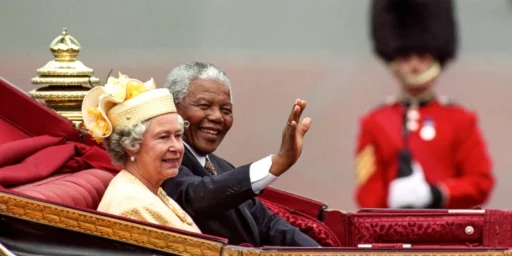Myth of American Innocence
Robert Kagan argues in a New Republic cover story that, contrary to our self-image as reluctant warriors who flex our muscles only when absolutely forced into it, the United States has been an expansionist power from the earliest days of our history.
How do we reconcile the gap between our preferred self-image and this historical reality? With difficulty. We are, and have always been, uncomfortable with our power, our ambition, and our willingness to use force to achieve our objectives. What the historian Gordon Wood has called our deeply rooted “republicanism” has always made us suspicious of power, even our own. Our enlightenment liberalism, with its belief in universal rights and self-determination, makes us uncomfortable using our influence, even in what we regard as a good cause, to deprive others of their freedom of action. Our religious conscience makes us look disapprovingly on ambition–both personal and national. Our modern democratic worldview conceives of “honor” as something antiquated and undemocratic. These misgivings rarely stop us from pursuing our goals, any more than our suspicion of wealth stops us from trying to accumulate it. But they do make us reluctant to see ourselves as others see us. Instead, we construct more comforting narratives of our past. Or we create some idealized foreign policy against which to measure our present behavior. We hope that we can either return to the policies of that imagined past or approximate some imagined ideal to recapture our innocence. It is easier than facing the hard truth: America’s expansiveness, intrusiveness, and tendency toward political, economic, and strategic dominance are not some aberration from our true nature. That is our nature.
While doubtless correct, it is at start contrast with a famous 1998 essay in Foreign Policy which described the United States as a “Benevolent Empire.”
The unique qualities of American global dominance have never been a mystery, but these days they are more and more forgotten or, for convenience’ sake, ignored. There was a time when the world clearly saw how different the American superpower was from all the previous aspiring hegemons. The difference lay in the exercise of power. The strength acquired by the United States in the aftermath of World War II was far greater than any single nation had ever possessed, at least since the Roman Empire. America’s share of the world economy, the overwhelming superiority of its military capacity —- augmented for a time by a monopoly of nuclear weapons and the capacity to deliver them -— gave it the choice of pursuing any number of global ambitions. That the American people “might have set the crown of world empire on their brows,” as one British statesman put it in 1951, but chose not to, was a decision of singular importance in world history and recognized as such. America’s self-abnegation was unusual, and its uniqueness was not lost on peoples who had just suffered the horrors of wars brought on by powerful nations with overweening ambitions to empire of the most coercive type. Nor was it lost on those who saw what the Soviet Union planned to do with its newfound power after World War II.
The uniqueness persisted. During the Cold War, America’s style of hegemony reflected its democratic form of government as much as Soviet hegemony reflected Stalin’s approach to governance. The “habits of democracy,” as Cold War historian John Lewis Gaddis has noted, made compromise and mutual accommodation the norm in U.S.—Allied relations. This approach to international affairs was not an example of selfless behavior. The Americans had an instinctive sense, based on their own experience growing up in a uniquely open system of democratic capitalism, that their power and influence would be enhanced by allowing subordinate allies a great measure of internal and even external freedom of maneuver. But in practice, as Gaddis points out, “Americans so often deferred to the wishes of allies during the early Cold War that some historians have seen the Europeans —- especially the British —- as having managed them.”
The author of that piece? Robert Kagan.
As a side note, both essays are a pretty good antidote to the notion that the United States has always been beloved by all until the evil George W. Bush rode into town and ruined it all with his arrogant ways. The 1998 essay, written in the aftermath of the Lewinski scandal, observed:
Temporarily interrupting their steady grumbling about American arrogance and hegemonic pretensions, Asian, European, and Middle Eastern editorial pages paused to contemplate the consequences of a crippled American presidency. The liberal German newspaper Frankfurter Rundschau, which a few months earlier had been accusing Americans of arrogant zealotry and a “camouflaged neocolonialism,” suddenly fretted that the “problems in the Middle East, in the Balkans or in Asia” will not be solved “without U.S. assistance and a president who enjoys respect” and demanded that, in the interests of the entire world, the president’s accusers quickly produce the goods or shut up. In Hong Kong, the South China Morning Post warned that the “humbling” of an American president had “implications of great gravity” for international affairs; in Saudi Arabia, the Arab News declared that this was “not the time that America or the world needs an inward-looking or wounded president. It needs one unencumbered by private concerns who can make tough decisions.”
It is only during short-lived moments of perceived American weakness, such as the days after the 9/11 attacks, that the international community loves us. The reason was eloquently explained by Nicolo Machiavelli nearly a century before the first British colony was established here:
Upon this a question arises: whether it be better to be loved than feared or feared than loved? It may be answered that one should wish to be both, but, because it is difficult to unite them in one person, is much safer to be feared than loved, when, of the two, either must be dispensed with. Because this is to be asserted in general of men, that they are ungrateful, fickle, false, cowardly, covetous, and as long as you succeed they are yours entirely; they will offer you their blood, property, life and children, as is said above, when the need is far distant; but when it approaches they turn against you. And that prince who, relying entirely on their promises, has neglected other precautions, is ruined; because friendships that are obtained by payments, and not by greatness or nobility of mind, may indeed be earned, but they are not secured, and in time of need cannot be relied upon; and men have less scruple in offending one who is beloved than one who is feared, for love is preserved by the link of obligation which, owing to the baseness of men, is broken at every opportunity for their advantage; but fear preserves you by a dread of punishment which never fails.
And so it remains.






No one is making the contention that everyone has been happy with the US in the 20th century, but we have always had allies who were willing to come to our aid. Some people will probably always not like us as a country, but Bush and his administration have managed to piss off the people who have traditionally stood by our side. That’s were the damage has been done. No country on earth is more similar to us than Great Britain, but when you see that even their electorate has turned against us, something is out of whack, and it portends to greater problems with the people who have been lukewarm or disliked us just a bit. You have to make Bush responsible for a good deal of the worsening of our relationships with other friendly parts of the world.
>Upon this a question arises: whether it be better to be loved than feared or feared than loved?
Loved? No, I don’t think that’s necessary. But we need to be respected, which we no longer are.
Feared? Well, fear is an interesting thing. Fear could say, drive a dictator or two to conclude that they need to have nukes to protect them from America. Oh wait, that’s already happening.
“How do we reconcile the gap between our preferred self-image and this historical reality?” People cannot remain sane without rationalization; the same is true of nations
James, oh James,
There should be a version of Godwin’s law that says whenever representative democracies and their relationships are being discussed, the first person to mention Machiavelli in a positive way loses the argument.
Because, of course, Japan, the UK, Canada and all the other nations who have been lauded for joining Bush’s failed occupations in Iraq and Afghanistan did so only out of fear, right?
And come to think of it, the problem with fear is that, at the first sign of weakness, your fearful allies turn on you – as happened with the Soviet satellites as the great bear slumped – or become double-agents as has happened with Pakistan’s “joining” the effort to deal with Islamist extremist terrorism.
If you want a far better explanation of why America presents an ever-changing foreign policy face to the world, then Dave Schuler at The Glittering Eye has it right – not a failed renaissance politico.
Anyway, since when did those the American public elected to work for them become Princes? The Founders, I hope and believe, would prefer us all to strive to remember that A Man’s A Man For All That.
You see yonder fellow called ‘a lord,’
Who struts, and stares, and all that?
Though hundreds worship at his word,
He is but a dolt for all that.
For all that, and all that,
His ribboned, star, and all that,
The man of independent mind,
He looks and laughs at all that.
Regards, C
Cernig,
Quoting The Prince doesn’t constitute an endorsement of aristocracy. I’m merely quoting Machiavelli on his assessment of human nature.